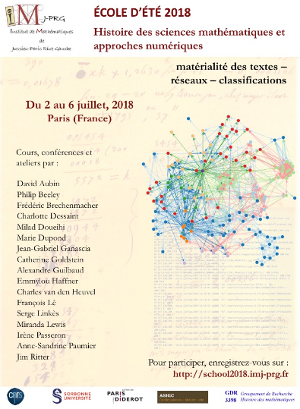The English mathematician John Collins (1625–1683) did not travel to France during his lifetime. However, his correspondence catalogue in EMLO was one of a cluster showcased at a Summer School entitled Histoire des sciences mathématiques et approches numériques : matérialité des textes, réseaux, classifications that took place last week in Paris at the Jussieu campus of the Sorbonne Université. Organized by Catherine Goldstein (CNRS, IMJ-PRG), Jean-Gabriel Ganascia (UPMC, LIP6), Alexandre Guilbaud (UPMC, IMJ-PRG), Irène Passeron (CNRS, IMJ-PRG), and Richard Walter (CNRS, ITEM), the Summer School brought together from around the world mathematical historians and students to discuss and explore the opportunities offered today by a variety of digital approaches and tools. In the course of five intense days, the impact of these approaches on research methodologies and practices was assessed and considered, and questions were raised about both their advantages and their limitations.
 With a plenary to deliver and a series of workshops to run in the course of the week, Philip Beeley, Charlotte Marique, and I ‘packed’ a variety of sample letters from the correspondences of early modern practitioners of mathematics, all of whom either have catalogues in EMLO or for whom we are in the process of preparing an epistolary inventory. Along with letters by John Collins, we took (in alphabetical order to avoid any excuse for dispute!) examples from the correspondences of René Descartes, Leonhard Euler, Pierre Fermat (or Pierre de Fermat — the form of his name itself became a topic of discussion during the week), Joachim Jungius, Pietro Mengoli, Isaac Newton, Blaise Pascal, and John Wallis. Fractious, querulous travelling companions these early modern individuals would no doubt have been, and it proved a sustaining game to imagine who might be saying what as we made our way across the channel and back, through delays, rail strikes, football mania, and sweltering temperatures.
With a plenary to deliver and a series of workshops to run in the course of the week, Philip Beeley, Charlotte Marique, and I ‘packed’ a variety of sample letters from the correspondences of early modern practitioners of mathematics, all of whom either have catalogues in EMLO or for whom we are in the process of preparing an epistolary inventory. Along with letters by John Collins, we took (in alphabetical order to avoid any excuse for dispute!) examples from the correspondences of René Descartes, Leonhard Euler, Pierre Fermat (or Pierre de Fermat — the form of his name itself became a topic of discussion during the week), Joachim Jungius, Pietro Mengoli, Isaac Newton, Blaise Pascal, and John Wallis. Fractious, querulous travelling companions these early modern individuals would no doubt have been, and it proved a sustaining game to imagine who might be saying what as we made our way across the channel and back, through delays, rail strikes, football mania, and sweltering temperatures.
At the Summer School, we were treated to wide-ranging talks and workshop sessions on key aspects of mathematical history, digital approaches, and future possibilities. In addition to the detailed courses and discussions led by the organizers on materiality, networks, and classification, we attended a variety of inspirational lectures, including Milad Doueihi on ‘Computation and the Humanities: Past and Present’, and Charles van den Heuvel on ‘Paper Bulwarks and Digital Fortresses. Mixed Methods for analyzing the Duytsche Mathematique’. Workshops provided the students with an introduction to XML/TEI; to transcription tools; to the truly wonderful database, Manuscrits, Usages des Supports d’Ecriture [MUSE], conceived and constructed by Claire Bussaret and Serges Linkès to allow detailed material description (for example, of paper types, watermarks, and seals) to be recorded; and of course to our own EMLO and its array of metadata collation tools.
It was a privilege to receive an invitation to address the participants at this Summer School and to have been offered the opportunity to discuss the possibilities of future collaboration with esteemed colleagues in the history of mathematics. We will write here in due course of a number of the ideas and schemes considered. For the present, however, as we unpack teaching materials that include copies of the letters of our early modern travelling companions, we continue to play our own travelling game of ‘Fantasy Early Modern Comments’ (a fine alternative to Fantasy Football, I might add!) by imagining how EMLO’s mathematicians would have responded to this French excursion — travelling attire, wigs, heat, and all. While we have no doubt that Mr Collins would be pleased to see the inventory of his correspondence swell last week to 264 letter records as an installment of the correspondence in the care of the Library at the University of St Andrews was added, we suspect other members of our Oxford-London travelling party might not be so well disposed or compliant. If you feel to join our summer game, complaints (ascribed to early modern mathematician) by email, please.
